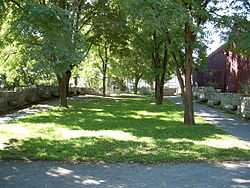Sarah Wildes
| Sarah Wildes | |
|---|---|
| Born |
Sarah Averill 1627 Chipping Norton, England |
| Died |
July 29 [O.S. July 19], 1692 (aged 65) Salem Village, Province of Massachusetts Bay |
Cause of death | Execution by hanging |
| Residence | Topsfield, Province of Massachusetts Bay |
| Nationality | English |
| Occupation | Housewife |
| Known for | Convicted of witchcraft in the Salem witch trials |
| Spouse(s) |
|
| Children |
|
| Parent(s) |
|
Sarah (Averill) Wildes (1627 – July 19, 1692) was executed by hanging for witchcraft during the Salem witch trials. She was later exonerated.
Family
Sarah was one of seven children born to William Averell[note 1] and Abigail Hynton, immigrants from Chipping Norton, England.[1] She married English immigrant John Wildes (born 1616) and had a son, Ephraim. Ephraim held the positions of town treasurer and constable during the period of the conspiracy.[2] They were residents of Topsfield, a neighboring town of Salem, in the Massachusetts Bay Colony. Two of her step-daughters, Sarah (Wildes) Bishop and Phoebe (Wildes) Day, and a step-son-in-law, Edward Bishop Jr., were also accused of witchcraft.
Prior offences
Sarah had a reputation as a nonconformist in Puritan Massachusetts, with prior offences which may have made her an easy target for accusations of witchcraft. She was sentenced to be whipped for fornication with Thomas Wordell in November 1649, and later, in May of 1663, charged with wearing a silk scarf.[3] Also, because she married John so soon after his first wife's death, John's former in-laws held something of a grudge against her. John Wildes testified against his first wife's brother, Lieutenant John Gould, in a treason trial, which further angered the family. Shortly after, John's ex-sister-in-law, Mary Goulds Reddington, began circulating rumors that Sarah was a witch. When John threatened to charge her with slander, she retracted her claims, however, the groundwork was laid for future charges of witchcraft. The Goulds were related to the Putnam family, the central accusers during the Salem Witch Trials.
Salem witch trials
Constable Ephraim Wildes was ordered by the Marshall, George Herrick, to arrest Deliverance Hobbs. Hobbs, whether through coercion or not, made a jailhouse confession and implicated Sarah Wildes as a witch. Ephraim himself testified that he seriously believed Hobbs' accusation to be vengeance against him for arresting her.[2]
Ann Putnam testified:
I have been afflected ever sence the begi[n]ing of march with a woman that tould me hir name was willds and that she came from Topsfeild but on the 22 April 1692 Sarah willd did most greviously torment me dureing the time of hir Examination and then I saw that Sarah willds was that very woman that tould me hir name was willds and also on the day of hir Examination I saw Sarah willds or hir Apperince most greviously tortor and afflect mary walcott, Mircy lewes and Abigail willia [ms] and severall times sence Sarah wilds or hirs Apperance has most greviously tortored and afflected me with variety of torturees as by pricking and pinching me and almost choaking me to death.[2]
Sarah was condemned by the Court of Essex County for practicing witchcraft. She was executed by hanging in Salem, Massachusetts, along with Elizabeth Howe, Susannah Martin, Sarah Good, and Rebecca Nurse, on July 19, 1692 at 65 years of age.
Aftermath

All those convicted have since been formally pardoned of the hysterical accusations and subsequent convictions. The Salem Witch Trials Memorial includes a bench inscribed with Sarah's name.
Notes
- ↑ William is known to have spelled his name Averell, with a second "e", notably in the signature on his will, though his children and descendants often spelled the name Averill.
References
- ↑ Avery, Clara Arlette (1922). Supplement for Insertion in the Averell-Averill-Avery Family. p. 3. Retrieved 30 December 2013.
- ↑ 2.0 2.1 2.2 "Sarah Wilds Executed July 19, 1692". Salem Witch Trials Documentary Archive and Transcription Project. University of Virginia. Retrieved 22 December 2013.
- ↑ Robinson, Enders A. (1992). The Devil Discovered. Hippocrene Books. p. 295. Retrieved 30 December 2013.
Further reading
- Upham, Charles (1980). Salem Witchcraft. New York: Frederick Ungar Publishing Co., v. 2, pp. 135, 268, 480.
| ||||||||||||||||||||||||||||||||||||||||||||||||||||||